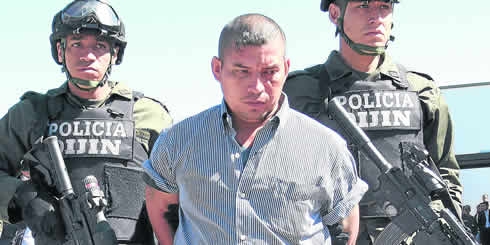At least 40 men are believed killed in the latest bout of fighting for control of drug crops on Colombia’s Eastern Plains and the lucrative cocaine routes that give access to Venezuela, local intelligence sources told InSight Crime.
The fighting is concentrated in Mapiripan, the province of Meta, where a series of assassinations have again increased tension in this remote and lawless coca-growing area.
The fighting comes as at least least four different groups try to fill a vacuum left by Pedro Oliveiro Guerreo, alias “Cuchillo,” killed by police in December 2010, and Daniel Barrera, alias “El Loco,” captured in September 2012.
The Eastern Plains, which stretch along the Brazilian and Venezuelan borders, are thought to generate as much as $300 million per year in cocaine sales.
Cuchillo set up a his paramilitary group, the Popular Revolutionary Anti-Terrorist Army of Colombia (ERPAC), in 2006, which until his death in December 2010 controlled much of the cocaine trade in the provinces of Meta, Guaviare, Vichada and Casanare. He also was the principal supplier of cocaine to Loco Barrera, one of Colombia’s most powerful drug traffickers.
InSight Crime Analysis
Of the former ERPAC factions remaining in the region, the dominant group is led by Martin Farfan Diaz, alias “Pijarbey,” once the ERPAC’s top military commander who was jailed briefly before returning to his former post. Pitted against him is Rafael Escobar Patiño, alias “Monstrico,” formerly an ERPAC middle ranking commander.
Pijarbey used to run the ERPAC’s fiefdom in Vichada. InSight Crime carried out investigations in Vichada prior to Pijarbey’s arrest in December 2009. Pijarbey had cocaine laboratories in the northern half of Vichada, and he would transport cocaine shipments northwards into Venezuela using a mixture of boats, moving along the many rivers and tributaries, and all-terrain vehicles.
Pijarbey spent just two years in prison. Once released, he immediately returned to his old haunting ground, re-assumed command of his fighters, and got back into the cocaine business. Intelligence sources told InSight Crime that he had sent fighters from Vichada into Meta, in an attempt to reunite the former ERPAC empire under his control.
The warring groups’ rivals are rebels from the Revolutionary Armed Forces of Colombia (FARC) and the country’s most powerful criminal syndicate, the Urabeños. But there have been indications that Pijarbey has struck a deal with the Urabeños already.
The Urabeños are now the most powerful criminal franchise in the country, with presence in at least 16 of the country’s 32 provinces. If this is true, it is likely that Pijarbey will emerge the victor. The Urabeños support their allies with money, weapons and sometimes with heavily-armed shock troops.
Aside from the FARC, no one has been able to resist the Urabeños advance. And whoever amongst the ERPAC wins will still probably have to come to an arrangement with the FARC, as the rebels control access to a large part of the coca crops in the region.
The FARC also have interests in Mapiripan. Here the rebel commander Elmer Mata Caviedes, alias “Albeiro Cordoba,” has been rebuilding the FARC’s drug trafficking operation in the Eastern Plains, commanding at least 500 fighters.
For their part, the FARC are happy to sell coca base to the highest bidder, which used to be the ERPAC. The ERPAC then processed the coca base into cocaine and moved it into Venezuela, now the principal transit nation for Colombian cocaine moving to the US or Europe.
While the main prize they are fighting for is control of up to 100 tons of cocaine produced on the Eastern Plains — which, in the US are worth up to $2 billion — there are two other important prizes to consider. The first is land. This region has some of the most productive land in the country. Control of this land has been at the root of Colombia’s 49-year civil conflict, and much of it has been bought by powerful drug traffickers and mafia figures. So whichever group takes control of this area, will also be able to seize land owned by drug traffickers, and demand “protection” payments to allow them to keep it.
The second prize is control of regional drug distribution, particularly in the provincial capital of Villavicencio, the gateway linking the Eastern Plains to Bogota, country’s biggest local drug market. There have been a rash of selective killings in Villavicencio over the last few months, including a massacre on December 8, when gunmen opened fire on five men drinking in a bar. Police believe the gunmen were sent by Pijarbey.

